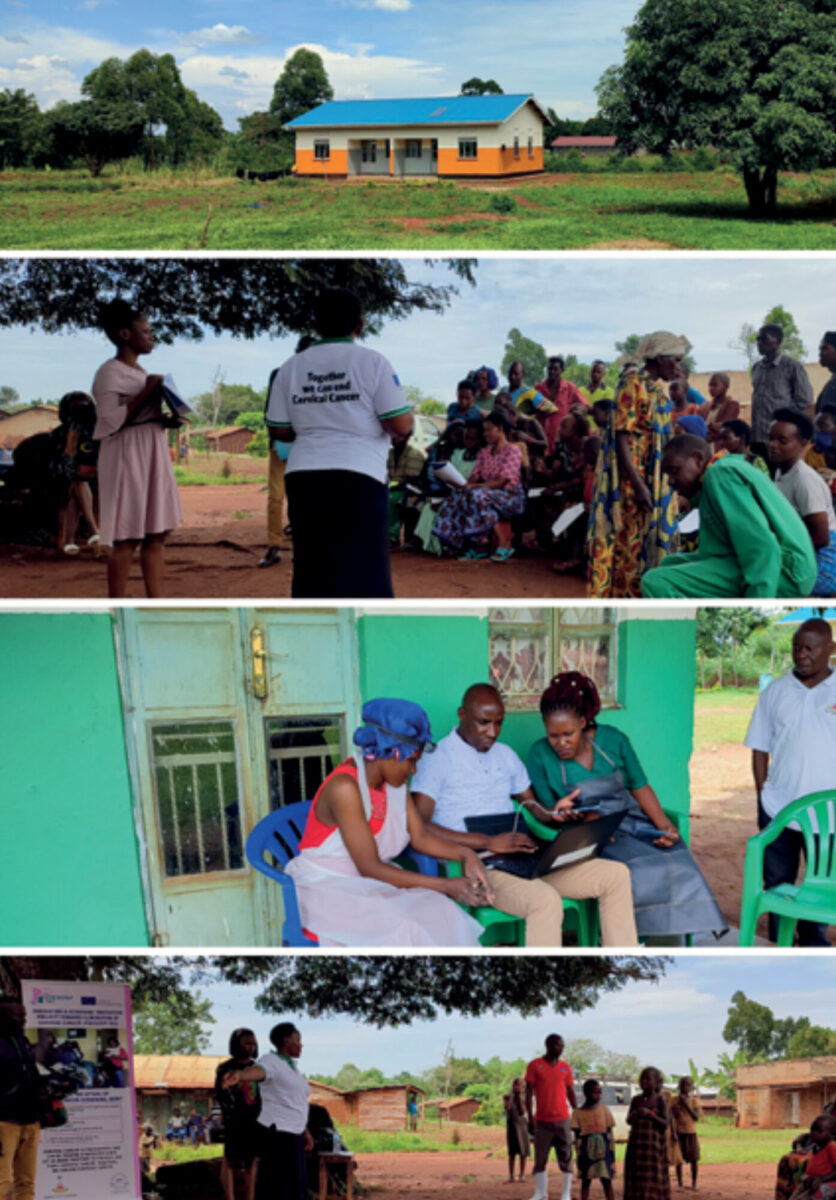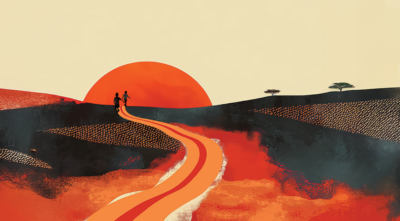Main content
“Is it possible to become a specialist after the ‘physician of Global Health and Tropical Medicine’ (GH&TM, in Dutch: AIGT) training and after having worked abroad?” This is a question that medical students often ask me. The short answer is YES! This year I graduated as a sub-specialist gynae-oncology after six years of working as a physician in the refugee camps on the Thai-Myanmar border, with subsequent gynaecology specialisation. Often the subsequent question is: “How does your experience have an impact on your work in the Netherlands?”. As a recently graduated sub-specialist, I decided to ask respected colleagues, some who followed the same path as I did, how they have integrated their experiences into their daily work. I received such motivating stories that I would like to share them. After a brief introduction about their professional life, we talked about the relation between their working experience in a low-income country, global health, and the sub-specialisation gynae-oncology.
The first question i asked them was: can you share something about the experience you had in low-resource settings?
Heleen van Beekhuizen, gyne-oncologist in Rotterdam, worked more than three years in Papua New Guinea (PNG) as a physician GH&TM and four years in Tanzania as a gynaecologist. “In Tanzania, my focus was on fistula surgery and oncology, besides the obstetric work.” Luc van Lonkhuijzen, gyne-oncologist in Amsterdam, was a medical officer in a district hospital in Botswana (two years) and Malawi (two years): “Apart from being able to care for many patients in need, this experience influenced my own career as well. In Botswana, I worked in a truly multicultural setting with colleagues from all over Africa. Having a lot of responsibilities as a young doctor helped me to develop a certain surgical confidence which is still useful in my current practice.” Lawrencia Dsane, gynaecologist in Zwolle, was born in Ghana. After secondary school, she studied medicine in Russia. She graduated as a gynaecologist in the Netherlands. During her study, she continued her work with a breast cancer clinic in Ghana through short stay visits. Lawrencia explains: “There are so many women who present with advanced stages of cancer that we often can’t do anything for them anymore. This stimulates me to make a difference in oncology care for women.” Also Jogchum Beltman, gynae-oncologist in Leiden, lived in Malawi: “I worked from 2005-2007 in Thyolo, a large district hospital in the South. That experience had a huge impact on me in terms of responsibility and coping with few resources. It helped me to develop clinical skills which I currently still use.” Marlieke de Fouw, OBGYN resident/ PhD student in Leiden, was a “Doctors without Borders” doctor for four years in various projects in PNG, Sierra Leone, Ethiopia and South Sudan. Marlieke added: “Although all projects were different, obstetrical care and care for survivors of sexual violence was an important issue.” A few years ago she joined the Female Cancer Foundation (FCF, a Dutch foundation which strives to eradicate cervical cancer) and contributed to cervical cancer projects in Uganda, Gambia, Malawi and Ethiopia.[1]

How do your experiences in low-resource settings have an impact on your work in the netherlands?
Marlieke: “I discovered my strengths and limitations, which proved to be extremely valuable during my OBGYN training- I have gotten to know what I needed to learn. Furthermore, I learned that all people share a common desire, which is respectful care. Listening and being interested in people is really important, anywhere in the world.” Heleen agrees: “The impact is obvious in my communication with women from another culture: I feel connected. But also, technically – I learned to be creative and that still helps in solving surgical problems.” Jogchum adds another important issue: “My daily motivation for work comes from the enormous burden of cervical cancer in the world. As a gyne-oncologist, I would like to make a difference in quality of care.”
Cancer projects in poor-resource settings
Jogchum explains: “Cancer is a rising problem in low- and middle-income countries (LMICs). Life expectancy is improving, and there is a change in lifestyle. The speed of this transition necessitates training local health workers.” Luc: “Yes I totally agree. The gynae-oncology training in Eldoret, Kenia, which I was involved in, is a perfect example of global health training. It is important that subspecialist training is being recognised locally. It leads to quality improvement because local doctors can perform advanced surgeries as they are now adequately trained in gynae-oncology.” Heleen: “I spend the most time on research and care for women with gynaecological cancer in the Netherlands, especially on screening and vaccination for HPV. Globally, every year half a million women die from cervical cancer. Therefore I started the website www.HPVkankervrij.nl and I am very active in the International Gynaecologic Cancer Society.”[2] Lawrencia participates in the Breast Care International (BCI Ghana) screening and prevention programmes. During the ‘walk for cure’ breast cancer awareness campaigns we address taboos, myths and disinformation about (breast) cancer. In May 2022, we organised the launch of the Lancet Oncology Commission on cancer in sub–Saharan Africa.[3] Marlieke: “Palliative care does not exist in many places in Africa, but I hope good examples such as ‘Hospice Africa’ will inspire oncologists in the world to include palliative care.”[4]
Training and research
It is striking how much this group of dedicated sub-specialists is involved in training and research next to their clinical tasks. Examples include hands-on emergency obstetric and surgical skill training for doctors in Berekum, Ghana and training for the Female Cancer Foundation (FCF). The FCF received a large European grant for an innovative implementation project on cervical cancer screening in Asia, Africa and Eastern Europe (including focusing on artificial intelligence, social media and HPV tests).[5] Marlieke is one of the PhD students of this project: “Being involved in global health projects gives me a lot of energy. As described in the book Afrika is besmettelijk [6] [Dutch book about a doctors’ experience working in Africa, translated meaning something like ‘Africa is catching’], I am infected with the global health virus. That motivation helps me to combine my resident training and PhD work.”
What are potential barriers for success of global gynae-oncology projects?
Luc: “Such projects should always be embedded within the local situation to ensure adequate support. For example, treatment for cervical cancer is complicated. In early stages, a radical hysterectomy can be life-saving. However, this requires specific skills of the surgeon and quality care of the hospital staff as well as good anaesthesia, electrocoagulation, and post-operative-care. Therefore, just training a surgeon is not enough. Global surgery projects should involve the whole continuum of care. All screening programmes should also facilitate treatment for women who have been diagnosed with cervical cancer. But I recognize that radiotherapy may not be available in many settings. Maybe the most affordable gynaecological cancer to cure is gestational trophoblastic disease, but women need to be motivated to come for follow up.” All: “Yes, we agree. Oncological care is a multidisciplinary team work and complex to organise. This is often not the case in resource-poor settings, but with more attention for global surgery projects, there will be more collaboration and, if we work together, oncology teams may be able to make a difference.”
Drivers to stay motivated and passionate
Lawrencia and Marlieke: “During our projects in LMICs, we saw and heard of women who died from cervical cancer on a daily basis. When we tell our colleagues in the Netherlands, they often cannot believe this. This is so unfair. This drives us in our motivation to make cancer prevention programmes accessible for everybody.” Luc: “It is a must for every doctor: do not accept injustice in this world, and care for all patients irrespective of their background, ethnicity or culture”. Jogchum recommends reading the book The power of women written by Denis Mukwege, a gynaecologist from Congo.[7] “Widen your scope, open your mind to the world, make a difference.” Heleen congratulates me on my new position and concludes: “As a gyne-oncologist you will perform long surgeries and hard work, so please continue doing things which provide you lots of positive energy. Let’s work together in fighting gynaecological cancer”.
Ready to take off
In January 2023, I will start as a consultant gynae-oncology in the Antoni van Leeuwenhoek Hospital in Amsterdam. I feel privileged to have such an inspiring group of people around me in the Netherlands. In order to boost each other with positive energy and collaborate in medical care, research and education, we started the global gyne-oncology group within the working party International Safe Motherhood and Reproductive Health (WP-ISM&RH). Several projects are planned to improve access to a high quality of gyne-oncology care on a global scale, education and research.[8] And all these projects are in close collaboration with our partners from LMICs.
If you are interested in the work of our group or for other questions, do not hesitate to contact us. On behalf of the global gyne-onco group,
References
- https://www.femalecancerfoundation.org/
- https://igcs.org/
- https://www.thelancet.com/infographics-do/cancer-sub-saharan-africa
- https://www.hospice-africa.org
- https://prescriptec.org/
- Steven van de Vijver. Afrika is besmettelijk. Nijgh & Van Ditmar, 2008. ISBN: 9789038894454
- Denis Mukwege. The power of women. 2021. Flatiron Books. ISBN: 9781250769190
- https://utrechtsummerschool.nl/courses/life-sciences/global-surgery-obgyn



















































